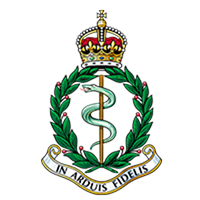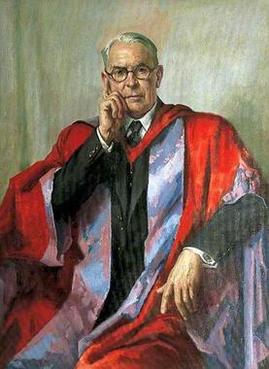Related Research Articles

The Royal College of Nursing (RCN) is a registered trade union and professional body in the United Kingdom for those in the profession of nursing. It was founded in 1916 as the College of Nursing, receiving its royal charter in 1928. Queen Elizabeth II was the patron until her death in 2022, King Charles III continued the royal connection and became patron in 2024. The majority of members are registered nurses; however student nurses and healthcare assistants are also members. There is also a category of membership, at a reduced cost, for retired people.

The Royal Army Medical Corps (RAMC) was a specialist corps in the British Army which provided medical services to all Army personnel and their families, in war and in peace.

Henry Bucknall Betterton, 1st Baron Rushcliffe,, known as Sir Henry Betterton, Bt, between 1929 and 1935, was a British barrister and Conservative politician. He served as Minister of Labour under Ramsay MacDonald between 1931 and 1934.

Uxbridge was a local government district in north west Middlesex, England, from 1849 to 1965, seated in the town of Uxbridge.

Matron is the job title of a very senior or the chief nurse in a hospital in several countries, including the United Kingdom, and other Commonwealth countries and former colonies.

Ethel Gordon Fenwick was a British nurse who played a major role in the History of Nursing in the United Kingdom. She campaigned to procure a nationally recognised certificate for nursing, to safeguard the title "Nurse", and lobbied Parliament to pass a law to control nursing and limit it to "registered" nurses only.

Leeds General Infirmary, also known as the LGI, is a large teaching hospital based in the centre of Leeds, West Yorkshire, England, and is part of the Leeds Teaching Hospitals NHS Trust. Its previous name The General Infirmary at Leeds is still sometimes used.
Nursing in the United Kingdom is the largest health care profession in the country. It has evolved from assisting doctors to encompass a variety of professional roles. Over 700,000 nurses practice, working in settings such as hospitals, health centres, nursing homes, hospices, communities, military, prisons, and academia. Most are employed by the National Health Service (NHS).

The Radcliffe Infirmary was a hospital in central north Oxford, England, located at the southern end of Woodstock Road on the western side, backing onto Walton Street.
Somerville Hastings, FRCS was a British surgeon and Labour Party politician.

The Queen's Nursing Institute (QNI) is a charity that works to improve the nursing care of people in their own homes in England, Wales, and Northern Ireland. It does not operate in Scotland, where the Queen's Nursing Institute Scotland performs a similar function. The QNI is also affiliated to the Queen's Institute of District Nursing in Ireland. The QNI is a member of the International Council of Nurses.

Arthur Moyle, Baron Moyle, CBE was a British bricklayer, trade union official and politician. As a member of parliament for nineteen years, he was principally known for serving as Parliamentary Private Secretary to Clement Attlee during Attlee's Premiership. He was also perennially lucky in the ballot for Private Member's Bills.
Sir Bernard Dudley Frank Docker was an English industrialist.
George Gibson CH was a British mental hospital attendant, trade unionist and public servant who was General Secretary of the National Asylum Workers' Union, later renamed the Mental Hospital and Institutional Workers' Union, from 1913 to 1947, then of the Confederation of Health Service Employees, into which the previous union merged, from 1947 to 1948. He was ruined through his largely innocent association with the fraudster Sidney Stanley, which was exposed by the Lynskey Tribunal in 1948.
Colonel Cyril Banks MBE was a British engineer, company director, and politician. He was a Conservative Party representative, but his friendship with President Nasser and Egypt led him to sacrifice his career over the invasion of Suez.
Captain Sir Elias Wynne Cemlyn-Jones, known as Wynne Cemlyn-Jones, was a Welsh Liberal Party politician.

Sir John William Bowen CBE, known as William Bowen, was a British trade unionist and politician.
Rosalie Dreyer was a Swiss-born naturalised British nurse and administrator. Immigrating to England at the age of eighteen, she trained as a nurse in London and worked her way through the ranks to become matron, principal matron and chief matron-in-charge of the Nursing Service of the London County Council. Dreyer was a pioneer in the development of Britain's public-funded nursing service.

Sir Alan Aird Moncrieff, was a British paediatrician and professor emeritus at University of London. He was most notable for developing the first premature-baby unit in 1947. It was Moncrief who recognised and developed the concept of daily parental visits to the ward, which he developed while at Great Ormond Street, well before the need for this became recognised, and with his ward sister, published an article on Hospital Visiting for Children in 1949.
Henry Betterton, 1st Baron Rushcliffe or Rushcliffe, as he was now known, was appointed by Ernest Brown the minister of health to chair the Nurses Salaries Committee which was established in October 1941. It was the first official body to fix salary scales and conditions for nursing in England.
References
- ↑ Rivett, Geoffrey. "Biographical notes on Sir Henry Burdett, 1847-1920". NHS History. Retrieved 5 June 2017.
- ↑ Abel-Smith, Brian (1960). A History of the Nursing Profession. London: Heinemann. p. 59.
- ↑ "British Hospitals Association". British Medical Journal. 28 June 1924. p. 1137. PMC 2304600 .
- ↑ "British Hospitals Association". British Medical Journal: 644. 8 November 1941. Retrieved 6 June 2017.
- ↑ First Report Of Nurses Salaries Committee Salaries And Emoluments Of Female Nurses In Hospitals. London: HMSO. 1943.
- ↑ Second Report of Nurses Salaries Committee Salaries and Emoluments of Male Nurses, Public Health Nurses, District Nurses And State Registered Nurses In Nurseries. HMSO. 1943.
- ↑ Webster, Charles (1988). The Health Services Since the War. London: HMSO. p. 23. ISBN 978-0116309426.
- ↑ "Report of meeting with British Hospitals Association on National Health Service Bill, 25 April 1946". Warwick Digital Collections. 15 May 1946. Retrieved 10 November 2022.